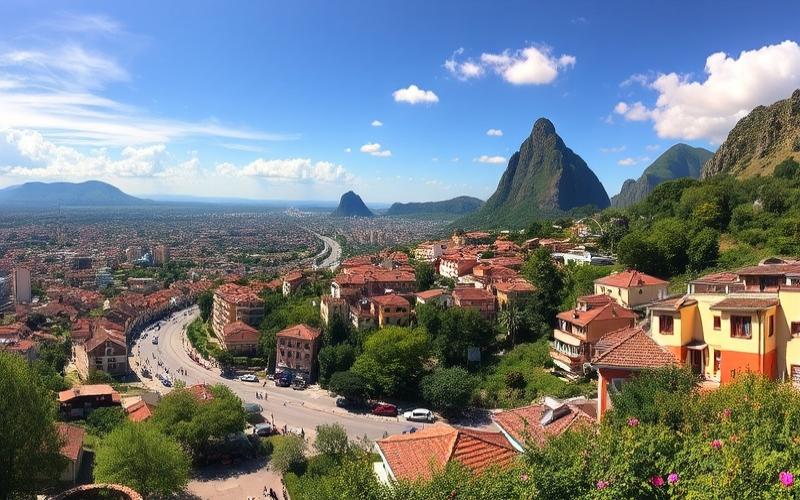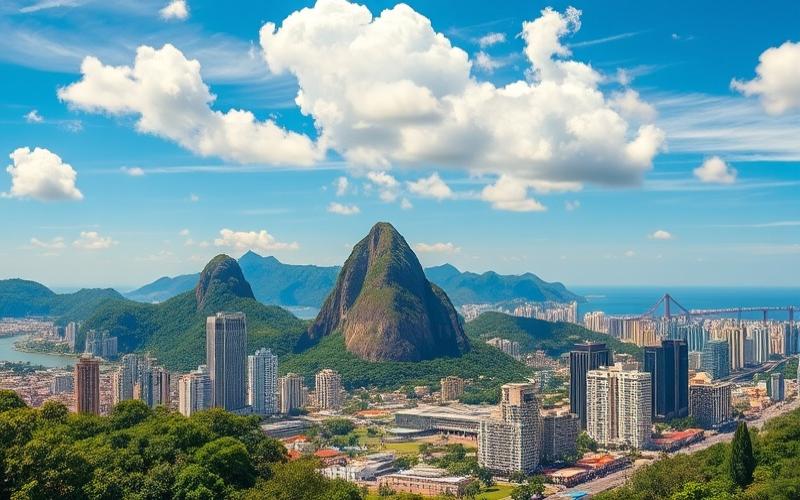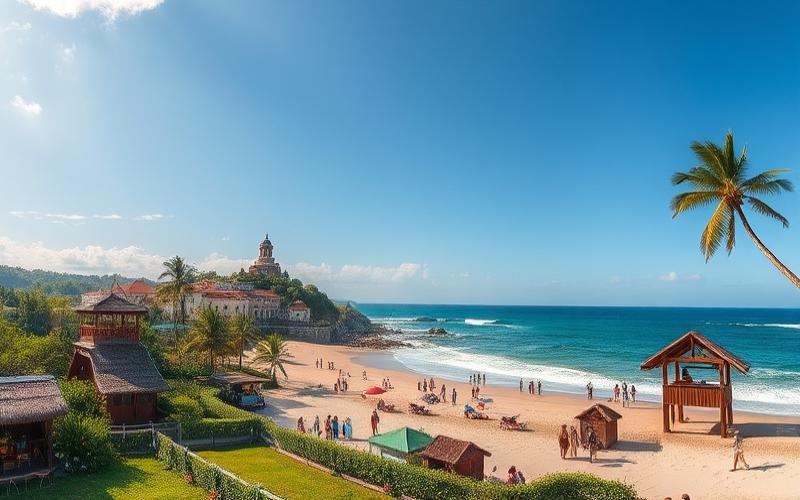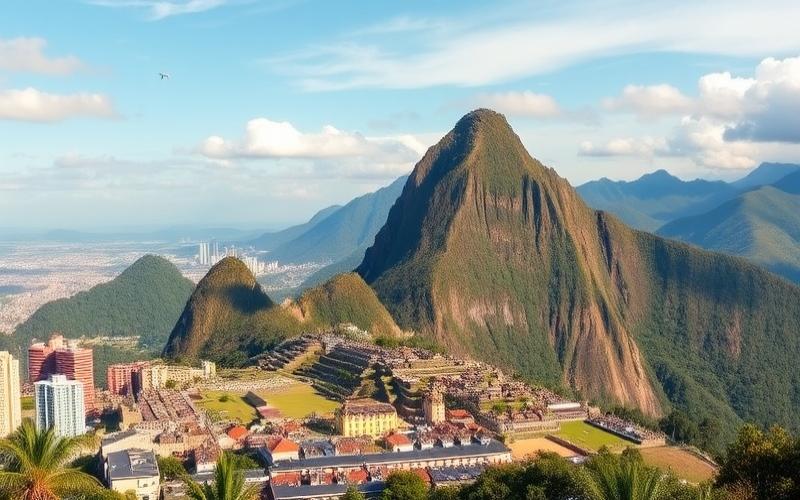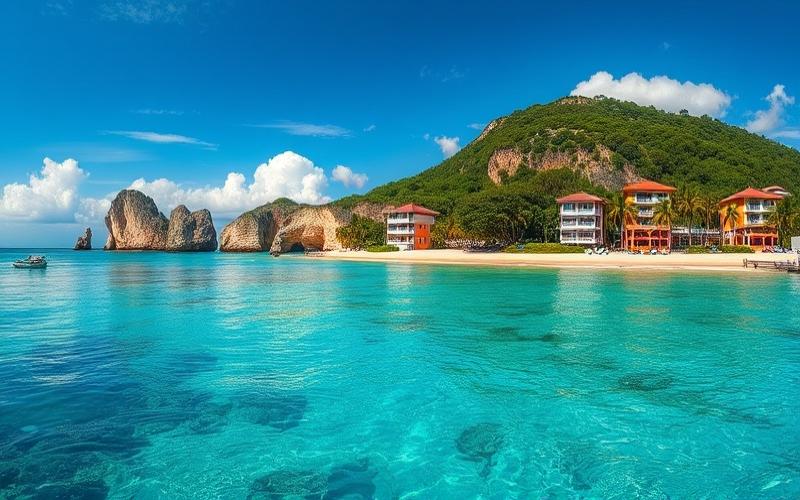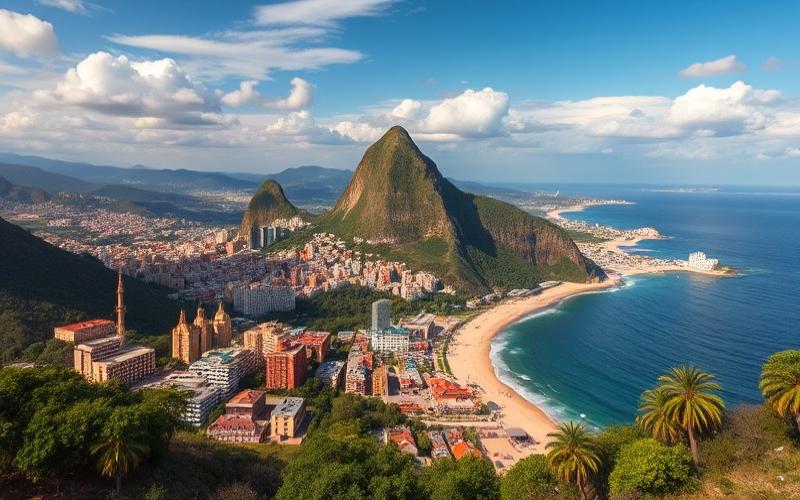
 Published on and written by Cyril Jarnias
Published on and written by Cyril Jarnias
Brazil, with its vibrant culture and breathtaking landscapes, is attracting an increasing number of expatriates seeking a balance between adventure and comfort.
In recent years, a new trend has emerged among these modern travelers: the growing appeal of secured residences. Offering a combination of security, luxury, and modern amenities, these private communities meet the rising expectations of an international clientele concerned about their peace of mind.
As Brazilian cities continue to develop and quality of life improves, these havens of peace are becoming top choices for those wishing to immerse themselves in the local culture while enjoying a controlled and privileged environment.
The Growing Demand for Gated Residences in Brazil
The growing demand for gated residences in Brazil is explained by a combination of economic factors (increased purchasing power among certain urban classes, attractiveness of tangible assets during inflation periods, search for stable rental income) and sociopolitical factors (perceived insecurity in major metropolitan areas, political polarization, influx of migrants and expatriates, and need for reliable living environments), which steer households and foreigners toward housing offering security, services, and contractual predictability.
- Economic Factors
- Rise of solvent urban households seeking properties with amenities and long-term appreciation.
- Macroeconomic volatility driving demand for secured residential real estate as a safe haven and source of recurring rental income.
- Professionalization of rental markets in major cities, making secured condominiums more liquid in the market.
- Sociopolitical Factors
- Priority given to security and continuity of services (electricity, water, incident management) within closed compounds.
- Regulatory framework allowing refugees and asylum seekers to rent through contracts, strengthening formal housing access for newcomers, some of whom prefer gated residences for predictability and support.
Impact of Perceived Insecurity and Expatriate Behavior
In several major Brazilian cities, perceived insecurity (theft, home-jacking, assaults) directs expatriates toward formats with access control, 24/7 surveillance, and professional management, to reduce exposure to risks and ensure peace of mind during prolonged absences.
Expatriates particularly value:
- Access control and video surveillance.
- On-site staff and rapid response to incidents.
- Visitor management and clear procedures in Portuguese/English.
- Proximity to international schools, private hospitals, and business hubs.
Real Estate Market Evolution and Developer Offerings
Brazilian developers are adapting by integrating modern infrastructure into gated residences:
- Smart access control, video surveillance, pedestrian/vehicle airlocks.
- Coworking spaces, gyms, pools, children’s play areas, bocce courts, lounges.
- Centralized technical management, responsive maintenance, resident applications.
- ESG standards (water/energy savings), solar panels, water recycling, EV charging stations.
The product is becoming institutionalized: multi-tower complexes, club condos, gated communities (condomínios fechados) with mixed-use features (local commerce, health, education).
Regions with Particularly Strong Demand
Metropolitan areas with high density and income levels:
- São Paulo (capital and ABC cities, Alphaville, Granja Viana).
- Rio de Janeiro (Barra da Tijuca, Zona Sul with secured condominiums).
- Brasília (Lago Sul/Norte, peripheral gated condominiums).
- Belo Horizonte (Nova Lima, horizontal condominiums).
- Curitiba, Florianópolis and Balneário Camboriú (premium market).
- Northeast capitals attractive for remote work and beach lifestyle (Recife, Fortaleza, Salvador), with gated complexes near educational and technological hubs.
Data and Recent Trends
Increase in formal rentals for mobile populations (refugees, expats, skilled workers), supported by the possibility of standardized rental contracts, which favors gated residences with professional management.
Growth of “full service” offerings (concierge, maintenance, à la carte services) inspired by international markets, reflecting expatriate demand for security and comfort, a positioning observed in other expatriation hubs and now replicable in Brazil through local and international developers.
Key Infrastructure and Services Sought
- Security: biometric access control, 24/7 video surveillance, on-site team, emergency protocols.
- Daily life: concierge, secure package delivery, visitor management.
- Well-being: pools, spas, gyms, green spaces, children’s areas.
- Digital: coworking, meeting rooms, high-speed internet, resident application.
- Mobility: EV charging stations, guest parking, private shuttles depending on projects.
Comparative Table of Selection Criteria
| Criterion | Gated Residence | Standard Building |
|---|---|---|
| Security | Access control + 24/7 surveillance | Doorman/limited control |
| Services | Concierge, maintenance, leisure | Basic services |
| Community | Professional rules and management | Heterogeneous |
| Costs | Higher but shared fees | Lower fees |
| Rental Liquidity | Strong among expats/families | Variable |
Case Studies and Expatriate Testimonials
- Case 1 – European family in São Paulo: priority on international schools and security; choice of a club condo with access control, pool, and children’s areas, to reduce logistical stress and secure children’s comings and goings.
- Case 2 – North American executive in Rio (Barra da Tijuca): remote work + travel; need for secure parking, on-site gym, and visitor management; 24/7 staff presence reduces anxiety related to late returns.
- Case 3 – Latin American entrepreneur in Brasília: selection of a peripheral gated community to combine calm, space, and harmonized security procedures; choice motivated by family protection and resale value.
- Case 4 – Newly arrived refugee with local contract: living in a managed residence facilitates understanding of the lease, handling of deposits, and access to an on-site support network, with a clear regulatory framework for renting.
Expatriate Checklists
- Assess security level: access procedures, system redundancy, response time.
- Review management: professional association, maintenance budget, incident history.
- Check surroundings: access to schools/hospitals, transportation, services.
- Analyze contract: duration, indexing, guest rules, pets, renovations.
- Compare fees vs services: energy costs, water, internet, reserve funds.
Key Takeaways
- The search for security, predictability, and services fuels demand for gated residences among expatriates and Brazilian urban households.
- Developers respond with integrated projects featuring enhanced security, modern infrastructure, and digital management.
- Demand hubs concentrate in major metropolitan areas and premium corridors, with acceleration in beach and administrative markets.
- The formal rental framework accessible to newcomers supports the professionalization of this niche.
Good to know :
The growing demand for gated residences in Brazil is primarily influenced by economic instability and perceived insecurity in metropolitan areas such as Rio de Janeiro and São Paulo. These sociopolitical factors encourage many expatriates to prioritize secure housing with optimal surveillance. In response to this trend, the Brazilian real estate market is undergoing notable evolution, with property developers constructing more residential complexes equipped with advanced security systems and modern facilities. According to recent data, demand for these properties has increased by 30% over the past two years, particularly in the southeastern and northeastern regions of Brazil. Testimonials from expatriates, such as that of Julien, a French investor, reveal that security and peace of mind, combined with quality amenities, are decisive criteria in their choice. These residences indeed offer a reassuring living environment, sharply contrasting with the perception of urban insecurity, thus becoming a preferred option for those seeking a balance between comfort and security.
The Appeal of Secure Neighborhoods for Expatriates
Expatriates favor secure neighborhoods in Brazil to preserve their privacy, benefit from enhanced security infrastructure, and ensure peace of mind for their families, in areas where police presence is more marked and crime is perceived as more contained.
- Privacy and Discretion: affluent areas, often inhabited by wealthy populations, offer more access control, fewer non-resident flows, and a daily life less exposed, which protects the privacy of expatriates and their loved ones.
- Security Infrastructure: increased police presence, patrols, cameras, building gates with concierge, and sometimes entry checks in residential complexes, beyond tourist and business sectors.
- Peace of Mind for Families: proximity to international or French schools, green spaces and neighborhood services, and the possibility to walk in certain areas considered safer during the day.
Concrete Examples of Neighborhoods and Residential Complexes Favored by Expatriates
- Rio de Janeiro: Leblon and Ipanema are highly sought after for their relative safety, quality of life, and access to services; Laranjeiras, Flamengo and Botafogo are appreciated by families, with a residential atmosphere and access to beaches and schools (e.g., French lycée).
- Recife: Boa Viagem, Graças, Poço de Panela, Casaforte are cited as safer, with increased vigilance at night away from main thoroughfares.
- Belo Horizonte: Lourdes, Santo Agostinho, Funcionários combine safety and a sophisticated ambiance, attracting executives and expatriates.
- Curitiba: Ahù and Barigui are recommended for their calmer residential setting compared to the hyper-center, suitable for families with cars.
Positive and Negative Impacts on the Local Community and Cultural Integration
Positive Impacts
- Local Economic Dynamism: arrival of expatriates with high purchasing power supporting commerce, restaurants, services, and private security.
- Improvement of Urban Services in Certain Sectors: more surveillance and maintenance in frequented areas, indirect benefits for local residents.
- “School Anchoring” Effect via international high schools and schools, strengthening educational offerings and some local cooperations.
Negative Impacts
- Rent Increases and Gentrification in safe neighborhoods, making housing access more difficult for historical residents and some expatriates with limited budgets.
- Social Segmentation and Reduced Diversity, with risk of isolation in residential bubbles and limited cultural integration outside international circuits.
- Displacement of Security Issues to less protected areas, and perception of a “double standard” in the allocation of security resources.
Role of Specialized Real Estate Agencies in Assisting Expatriates
- Selection of Properties in Safe Micro-Sectors, management of visits and access controls, and negotiation of security clauses (24/7 concierge, video surveillance, secure parking).
- School and Neighborhood Advisory: proximity to international/French schools, transportation, parks, hospitals, and daytime pedestrian traffic.
- Contract Compliance and Setup: lease, guarantees, domiciliation, home insurance, and provider recommendations (private security, alarm systems).
Current Real Estate Market Trends in Secure Zones
- Sustained Demand and High Prices in premium neighborhoods of Rio (Leblon, Ipanema) and in perceived safe pockets of regional capitals, with tension on the supply of family properties.
- Search for “Security + Quality of Life” Compromises toward leafy residential neighborhoods (e.g., Laranjeiras, Botafogo; Ahù/Barigui in Curitiba), sometimes at the expense of beach/center proximity.
- Rise of Security Criteria in Rental Choices: 24/7 doorman, access control, cameras, and proximity to police patrol zones or well-lit thoroughfares, particularly for end-of-day travel.
Practical Points of Vigilance for Families
- “Zero risk” does not exist: adapt routines (lit routes, avoid deserted streets at night), and stay informed of updated local guidelines.
- Differentiate Day and Night Security: some boulevards remain frequented and monitored in the evening while adjacent streets empty, increasing exposure to risk.
Summary Table: Reasons, Examples, Effects
| Key Element | Why Expatriates Value It | Examples Cited | Local Effects |
|---|---|---|---|
| Security/Privacy | Privacy, access control, police presence | Leblon, Ipanema; Boa Viagem; Lourdes | + Services and commerce move upmarket / – Gentrification |
| Families/Schools | Proximity to schools and parks, more serene movements | Laranjeiras, Botafogo; Ahù/Barigui | + School anchoring / – Social bubble |
| Infrastructure | Doorman, cameras, secure parking | Premium buildings in Rio’s South Zone | + Urban maintenance / – Spatial inequalities |
Good to know :
Expatriates often choose to settle in secure neighborhoods in Brazil, such as Barra da Tijuca in Rio de Janeiro or Morumbi in São Paulo, due to the significant protection they offer, including 24/7 surveillance systems, security personnel, and controlled access. These zones guarantee not only a high level of privacy but also a certain peace of mind, particularly valued by families concerned about their children’s safety. However, this preference for secured residences can create a certain distance from the local cultural life, limiting the integration of expatriates into the broader Brazilian community. Specialized real estate agencies play a key role in this process by guiding foreigners toward the options best suited to their needs while benefiting from rising real estate prices in these sought-after areas. Although this promotes the safety and comfort of newcomers, it can also accentuate socio-economic divisions and significantly influence the local real estate market.
Booming Premium Residential Services
Premium residential services in Brazil are experiencing strong acceleration, driven by the rise of an expatriate clientele seeking high-end amenities and enhanced security, in an overall growing and increasingly professionalized residential market. This dynamic is part of a broader wave of managed formats (build-to-rent, premium co-living, themed residences) offering integrated services and contractual flexibility, with high occupancy rates in high-end projects in major metropolitan areas.
Key Factors Fueling the Trend
- Market Growth and Formalization: estimated size of $59.61B in 2024 with a CAGR of approximately 5.4% until 2029, attracting structured developers and operators capable of deploying premium services.
- International Demand and Mobility: increase in urban demand for “move-in ready” housing with 24/7 security, particularly in São Paulo and Rio, where premium projects show waiting lists during hiring peaks in tech/finance.
- Professionalization of Supply: development of build-to-rent and co-living platforms managed by local and international capital, standardizing service quality (concierge, maintenance, common areas).
- Favorable Investment Conditions: broadening of supply and improvement of financing conditions supporting the deployment of upscale residences.
Evolution of Resident Expectations
- Expanded Concierge: multilingual reception, space and service reservations (cleaning, dry cleaning, transport), relocation/settling-in assistance for expatriates, with standards inspired by high-end hospitality observed in managed residential formats.
- Facility Management: proactive maintenance, premium common areas (coworking, fitness, rooftop, lounges), and quality standardization by professional operators.
- Personalized Services: all-inclusive contracts, flexible durations, community activities, and peer networks to facilitate social and professional integration.
- Technological Innovations: keyless access, resident applications for service requests and reservations, managed Wi-Fi, integrated access control and CCTV, in line with the rise of managed residential and premium co-living products.
Recent Initiatives in Brazil to Attract Expatriates
- Premium Co-living in City Centers (São Paulo, Rio): all-inclusive offerings with 24/7 security, shared offices, networking events, and flexible leases, showing high occupancy rates and reduced time-to-lease.
- Rise of Managed Build-to-Rent: local and international funds structuring dedicated buildings with concierge, centralized facility management, and digital services to standardize the tenant experience.
- Themed and High-End Student Residences (PBSA): security, common areas, and services (cleaning, maintenance) converging toward premium standards, useful for young international professionals and expatriate students.
Table — What Distinguishes a Premium Secured Residence Targeting Expatriates
| Dimension | Premium Secured Offering | Traditional Urban Rental |
|---|---|---|
| Security | Access control, CCTV, 24/7 monitoring | Doorman/variable control |
| Contract | All-inclusive, flexible | Standard leases, separate fees |
| Services | Concierge, cleaning, fitness, coworking | Limited or non-existent |
| Experience | Resident apps, multilingual support, community | Informal |
| Occupancy | High in economic hubs | More heterogeneous |
Data, Trends, and Recent Signals
- Market Size and Growth: $59.61B in 2024, projected growth at ~5.4% CAGR until 2029, with entry of new players and rising prices/volumes.
- Occupancy and Demand: premium projects in metropolises with high occupancy rates and waiting lists during hiring cycles, indicating sustained demand for products with services.
- Professionalization: shift to managed formats (co-living, build-to-rent), supported by specialized capital and service standardization.
- Student Residences: addition of services (security, cleaning, common areas) that increase attractiveness and foreshadow the premium expectations of young expatriates and international talent.
Impacts on the Residential Real Estate Market
- Value and Rental Premium: premium services and enhanced security support higher rents and stable occupancy rates, improving the risk-return profile for investors.
- Increased Segmentation: emergence of a “managed premium residential” sub-segment targeting expatriates/young talent, with shorter turnover cycles but a more liquid pipeline.
- Quality Spillover Effect: standardization of maintenance, compliance, and services, raising market benchmarks, including in next-generation student residences.
- Capital Attractiveness: entry of specialized operators and funds fuels supply and accelerates product innovation, strengthening the competitiveness of major Brazilian metropolises.
Testimonials and Viewpoints
“The integration of all-inclusive services and 24/7 security tipped our decision toward a premium co-living in Vila Mariana; moving in was immediate thanks to the residence app.” — Expatriate resident, São Paulo.
“Premium build-to-rent formats show high occupancy rates and healthy turnover, driven by demand from international talent in tech and finance.” — Residential asset manager.
“Additional services (security, cleaning, common areas) increase the attractiveness and profitability of dedicated residential assets, especially for an international clientele.” — PBSA segment analyst.
Checklist — Key Expatriate Expectations in Premium Residences
- Multi-layer security (access control, CCTV, 24/7 presence).
- Contract flexibility and cost transparency (all-inclusive).
- Multilingual concierge and relocation/settling-in services.
- Workspaces and managed high-speed connectivity.
- Proactive maintenance and hotel-standard common areas.
- Community, networking events, and local integration.
Important Text: The premium residential services segment in Brazil is rapidly structuring around managed, secure, and flexible products, meeting the expectations of a mobile and international clientele, with measurable effects on rents, occupancy, and capital allocation.
Good to know :
Premium residential services are booming in Brazil thanks to increasing demand from expatriates, attracted by luxury amenities and enhanced security. This phenomenon is fueled by growing expectations for high-end concierge services, efficient facility management, and innovative technology for a personalized experience. Initiatives like the integration of smart home systems in São Paulo or wellness service packages in Rio de Janeiro appeal to this privileged clientele. According to a 2023 report, the presence of expatriates in these residences jumped by 20% in one year, demonstrating the positive impact on the residential real estate market. Experts indicate that these hyper-personalized services are becoming a key selection criterion for new arrivals, while some residents praise the peace of mind and daily comfort they provide. These trends are now shaping the landscape of secured residences, specifically tailored to the growing demand of an exacting foreign clientele.
Disclaimer: The information provided on this website is for informational purposes only and does not constitute financial, legal, or professional advice. We encourage you to consult qualified experts before making any investment, real estate, or expatriation decisions. Although we strive to maintain up-to-date and accurate information, we do not guarantee the completeness, accuracy, or timeliness of the proposed content. As investment and expatriation involve risks, we disclaim any liability for potential losses or damages arising from the use of this site. Your use of this site confirms your acceptance of these terms and your understanding of the associated risks.


